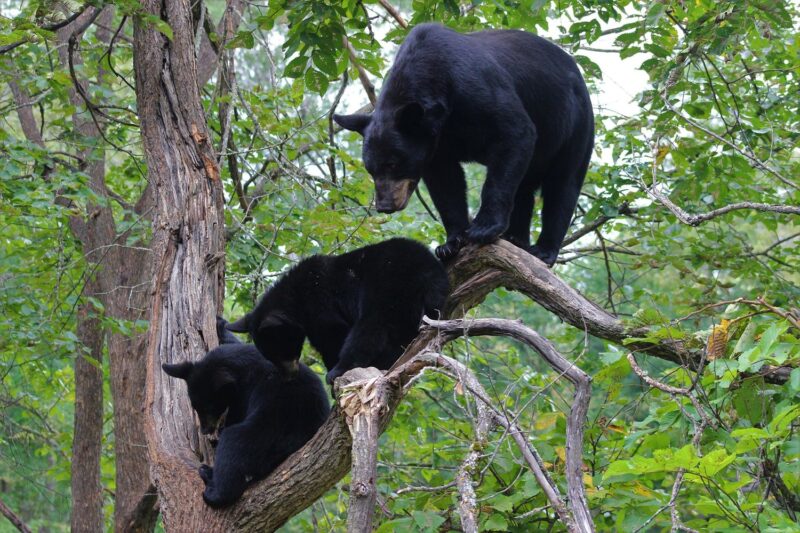With new bear talks coming, activists call for hounding ban
With bear season having started Sept. 1, and rising reports of bear encounters in Vermont’s more urban areas like South Burlington, the state is faced with new discussions on how best to manage its bear population, if at all.
Somewhere around 5,000 black bears live in Vermont, and recent estimates suggest approximately 14 percent of the population is hunted and killed each year, with a 2020 high of about 20 percent.
David Sausville, the department’s wildlife management program manager, said the population “has actually grown over the last 50 years,” with state estimates bottoming out around 2,000 bears in the early 1970s.

Despite the population statistics, animal rights groups worry how humane some of the bear-hunting practices are. “I mean, they are just treated pretty horribly in Vermont,” said Brenna Angelillo-Galdenzi, president and co-founder of the group Protect our Wildlife Vermont. To Angelillo-Galdenzi, taking a fifth of the bear population each year is “not a sustainable hunt.”
Her organization is seeking changes in bear-hunting laws in Vermont, “specific to the hunting of bears with hounds, (the) really long bear-hunting season and the fact that hunters can kill mother bears with cubs,” she said.
One Vermont trail camera caught a hunter shooting a bear sow with cubs last fall, prompting a petition back in April to the Vermont Fish and Wildlife Board, a rule-setting body. However, the board moved to table the petition until this fall, and hunting a sow with her cubs remains legal in Vermont.
Douglass Devos, president of the Vermont Bearhound Association, said nobody he knows would hunt a sow with cubs. “What you are looking for is a mature male,” Devos said, though he said he’s sure hunters sometimes kill mothers with their young. “There’s bad eggs in every group that can make the other guys look bad.”
About the renewed discussion this fall, Angelillo-Galdenzi said, “We are not hopeful that they’re going to vote yes on the petition.”
She believes board members are too sympathetic to hunting to work with. In a call to action emailed to members July 28, the group’s leadership wrote that “it is clearer than ever that the VT Fish and Wildlife Board must be dismantled.”
One particularly thorny point of debate between the activists, hunters and policymakers has been the practice of bearhounding — setting dogs after bears during hunts.
“They’re chased through the woods in the cornfields until the hounds either, you know, corner them on the ground or lead it up a tree,” Angelillo-Galdenzi said, referring to bears. “And that’s when the hunter tracks his dogs on his GPS device and shows up and literally shoots the bear out of the tree.”
But it’s a little different than shooting fish in a barrel, said Devos, the houndsman. If a hunter didn’t come up to the tree, they wouldn’t be able to tell the bear’s sex and weight and whether to shoot. Across a field, “you might think that’s a big bear and you shoot it and it’s an 80-pound female,” he said. “So ethically, it’s probably the most humane way.”
During the last legislative session, Vermont issued a temporary moratorium on hunters’ ability to use hounds to hunt coyotes. Deploying dogs for bear hunting, though, remains legal in Vermont. Rep. Larry Satcowitz, D-Randolph, introduced H.323 last session, which, if passed, would have prohibited the hunting of bears and coyotes with dogs across the board. But the bill didn’t leave committee.
Vermont’s long history of hunting, something once core to the state’s identity, means proposed rule changes can draw strong reactions.
“I don’t see how you can think of it as something that should be stopped. It’s something we’ve been able to do forever,” said Devos, who added that houndsmen like himself “take only a very small percentage” of the bears hunted each year in the state.
A sense of tradition guides many hunters. Sausville, the state wildlife management head, told Community News Service he treks out to hunt bears every year, something his family has done for decades.
“I have family members who do it, and we’ve been hunting in the same region for over 100 years,” he said. “It’s a good activity to have people get out on the land and be connected in a different way.”
Said Devos: “I’ve been doing it myself for 25 years, and I was taught from some old guys I used to hang out with. They’re gone now. My stepsons come hunting with us all the time. It is comparable to any other tradition any family would have.”
Angelillo-Galdenzi acknowledged the historic tradition of hunting in Vermont and described the difficulty groups like hers face in trying to restrict what hunters can do. “If any organization comes out threatening hunting in general, it’s a very polarizing discussion,” she said.
She stressed that her organization’s aim isn’t to ban hunting in general. The group supports “science-based hunting regulations,” she said, and opposes practices like hounding and leg-trapping that they view as inhumane.
Devos views regulation and limitation as one and the same. “Anytime somebody wants to adjust something, they typically take something away from you,” said Devos. “Your hobby, even if I don’t agree with it, it’s not my right to try and change it.”
For the future of bear-hounding, Devos thinks “anything can happen.”
“I’ve been doing it my entire life. It’s a huge part of my life. It’s not a hobby for me. It’s part of my life, along with many, many other houndsmen in the state,” said Devos.
If the state bans hounding, he believes regulations will creep into “whatever else is next on their list.”
(The Community News Service works in a partnership with The Charlotte News and other local media outlets to provide opportunities to University of Vermont students.)

